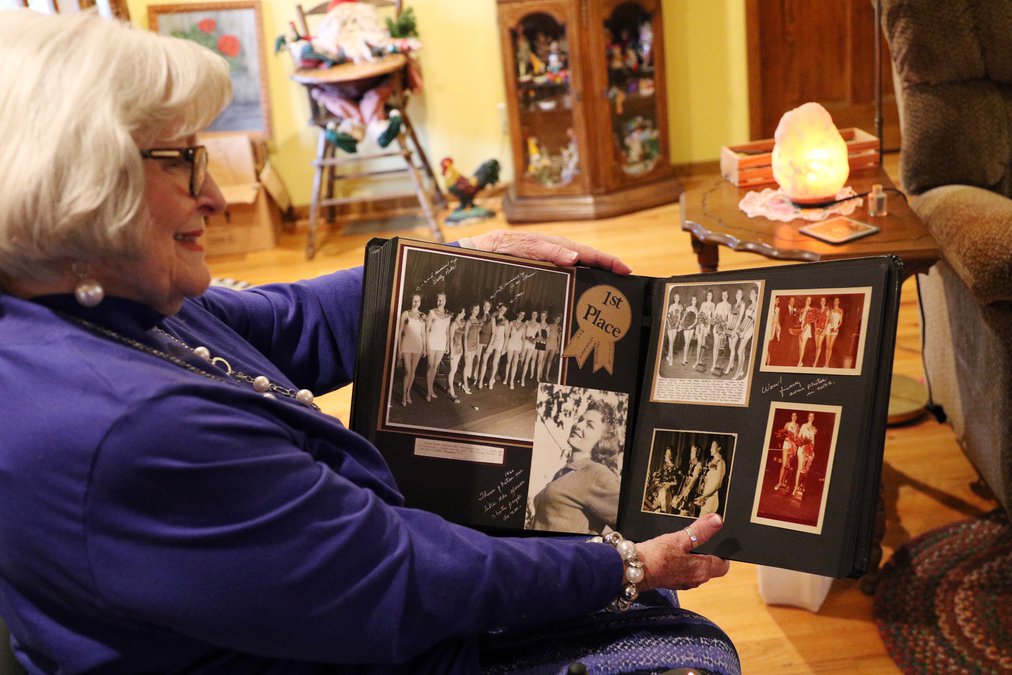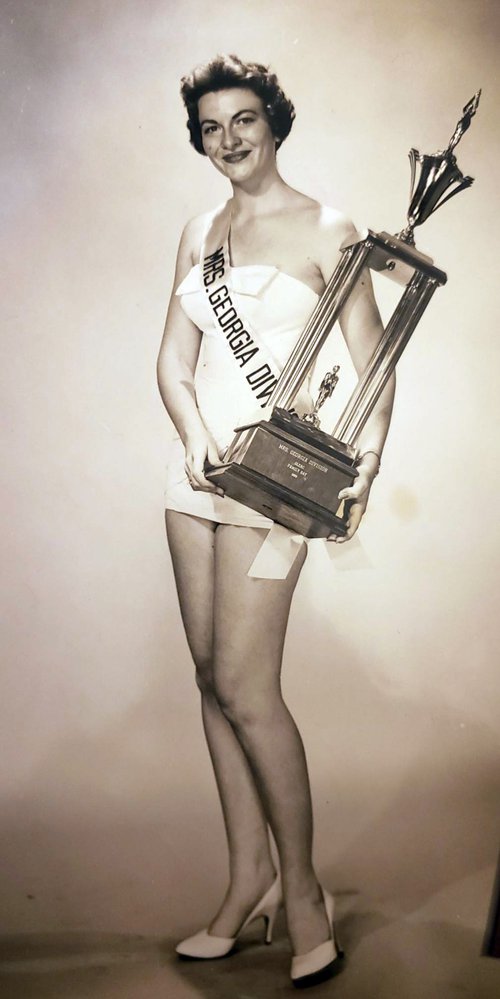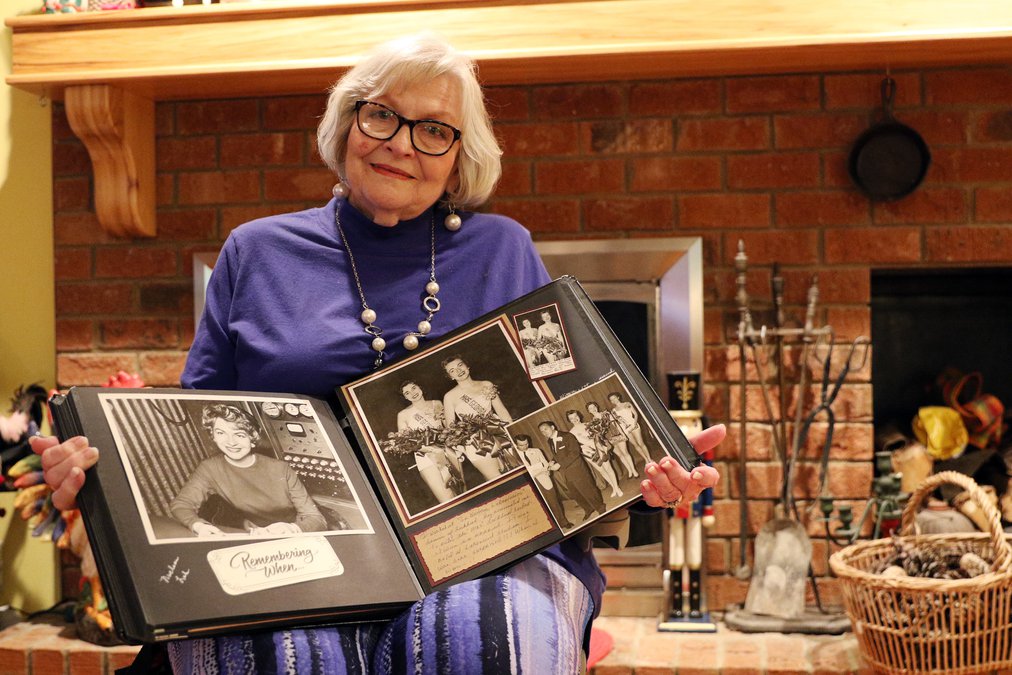The mornings always started like any other morning for Barbara Thompson. She’d put on her makeup, style her hair and head out the door on her way to work.
It was 1958 and Thompson was driving up Hwy. 9 heading towards her new job in Dawsonville.
With no homes in sight, Thompson made her way into Dawson Forest to a set of concrete buildings that just happened to be a nuclear test site for military aircraft.
And just one year later, she would earn a pageant title representing the Georgia Nuclear Aircraft Laboratory.


“I was excited. I was thrilled because it was something that I didn’t know about,” Thompson said of her new job. “I was excited because it was something new to do, and everybody was so friendly. It was like a big family. Even the big bosses were friendly and nice people.”
Thompson was looking for a career change in the late 1950s, having worked for three years in Atlanta at Westinghouse Electric. Her late husband was a mail carrier for the Lockheed Martin company at its Marietta location, and she was able to become a secretary at the new nuclear test site in Dawsonville when it opened in 1958.
Under Lockheed’s umbrella, the Georgia Nuclear Aircraft Laboratory was a small facility that was tasked with testing the effects of radiation on different objects and materials to study its effects. Its main focus was to create an efficient bomber aircraft that could carry atomic weapons while shielding the pilots. The facility closed permanently and was dismantled in 1971.
Remnants of the facility still remain inside Dawson Forest, with the foundations of buildings still intact and serving as a parking area for campers, hikers and outdoor enthusiasts.
It’s hard to imagine a small nuclear reactor and the hustle and bustle of scientists and government officials secretly working in a clear cut forest in Dawsonville, but for five years that was Thompson’s reality.
After being greeted by a sign that said “Plant No. 67,” Thompson remembers going through a little guard shack, always guarded by two guards – one on each end – and given a badge, not much bigger than her Apple Watch, before she would head into her office.
“We’d have to wear it on our outside clothing to measure if there was any radiation at all seeping around,” Thompson said. “Then at the end of the day we’d have to go back through that little thing and leave our badge, and they would check it that night to see if there was any radiation.”


Despite the fears that often surrounded the lab, Thompson said she never felt unsafe working at GNAL. She worked as a secretary under John Bell, who oversaw the maintenance department of the facility, in her late 20s and was never really exposed to the nuclear reactor during her time there.
Still, she had some concerns as she wanted to have children one day and received concerned comments from her friends and family, worried about the implications of working around nuclear chemicals on her health. In her later years, Thompson did have three knee surgeries due to her years on her feet running her beauty shop, but she never once thought it was due to her years at GNAL.
“All these people kept saying… ‘I bet it’s because you worked around all that radiation.’ All these rumors are not true,” Thompson said. “Rumors about radiation harming the people that worked there because it was very carefully checked and there was never any radiation.”
If there was ever a radiation leak, GNAL had an alarm system in place that reminded Thompson of her school days when it was time to run a fire drill.
“It was like being in school when they have a smoke alarm – they would have an alarm for everybody to get ready to leave the plant, line up at the gate and get ready to leave in case of an emergency,” Thompson said. “Most of the time it was just practice runs. We never really had to leave.”


After working at GNAL for nearly two years, she was asked if she would compete in the Mrs. Lockheed Georgia Division for the nuclear lab. Though admittedly a shy person, Thompson agreed to take part in the friendly competition.
“They had never had a Mrs. before so they decided they would have it at the nuclear plant,” Thompson said. “They made a big deal out of this one.”
Thompson traveled to the Lakewood Amusement Park in
Atlanta where she competed with other girls from Dawsonville and Marietta where
she became the first Mrs. Lockheed for the company.

“The crowd, it was really big. I mean, Lockheed Marietta was a huge place. I was scared to death. I mean a little ol’ country hick like me down there on that stage in a bathing suit, of all things, and I was always ashamed to wear a bathing suit anyway. It was fun though,” Thompson said, laughing. “They sort of made a big deal out of it. I was tickled to death to be involved in it.”
As the newly crowned pageant queen, Thompson received two dozen red roses, a sash, a trophy, and of course, a crown. Her duties as queen involved traveling to the Marietta facility to be a representative of the plant alongside Miss Lockheed where they would greet visitors from the company’s other facilities.
The crown also meant that Thompson was able to get a glimpse into some of the nuclear laboratory when she posed in front of a four foot deep glass window that separated scientists from the robotic arms that were tasked with handling radiated materials.
She also remembers a day when all the secretaries asked to see the reactor. Though the women weren’t able to see the reactor when it was hot their bosses did let them ride the small train that transported materials to and from the reactor.
“They said ‘some day when it’s cooled down and not hot we’ll let you go on the train.’ Well the train didn’t have seats. It was like a little truck, sort of like riding in the back of a truck, but we all loaded up on that thing and we went down there,” Thompson said. “It was scary. I didn’t like it. I didn’t like to see (the nuclear reactor). I didn’t like to think about it being down there. I felt like it was sort of an unknown monster that they kept in a cage… I just didn’t like being around it, but I never was afraid to go work or afraid I was going to get radiated.”
By 1960, Thompson was ready to switch gears in her career and enrolled in beauty school in Gainesville where she attended night class twice a week for two years to fulfill her dream of opening her own beauty shop.
In 1963, she said goodbye to her time at GNAL and worked to open The Barbara Shoppe in Cumming.
“I loved working there. I hated to quit, but I wanted to have a baby more and have a beauty shop more,” Thompson said. “I felt like it was more of a career because I felt like eventually, they were just testing stuff, it was just a test site.”


Thompson went on to have two children and ran The Barbara
Shoppe until her retirement in 2009.

Though she only spent five years at the nuclear lab, Thompson still feels a sadness thinking about the lab that once was.
Gone are the concrete buildings she had once called home. Gone are the days of sitting around with her friends inside the cafeteria in her office. Only the memories and a few precious photographs remain.
“I felt sad because I really hoped that it would be a real big thing like Lockheed so that people could have jobs and do like Lockheed in Marietta had done, but due to the circumstances of it, in my heart of hearts I sort of knew it wouldn’t,” Thompson said. “It was sad. I felt sort of like I did when my beauty shop burned. I felt sort of empty inside just thinking about it. For years I’d think about it and the people.”
When the lab closed, all of the dangerous materials were removed, either being destroyed or hauled out of Dawson County to be buried. Other materials that could be repurposed were either given away or auctioned off, Thompson recalled, as some of her friends from the lab took pieces of metal home.
Many fears surrounded the Georgia Nuclear Aircraft Laboratory during its operation. Thomson recalls the comments that she overheard or were often said to her while she was employed at the site.
“A lot of people said ‘oh I wouldn’t want to work there because you don’t know what they’re going to do, somebody might come over and bomb it,’” Thompson said. “A lot of people were scared and didn’t want it to be in the county. They were afraid, just like I said ‘they’ll come over here and bomb us’ or ‘it’ll explode and we’ll all be blown to kingdom come’ because nobody knew. There was no way that they could possibly know.”
Despite the fears often attached to nuclear testing, Thompson was – and still is – proud to say she worked at the laboratory.
“I was always proud to say that I worked there. I’m still proud to say I did because it was an experience that I won’t ever forget,” Thompson said.



